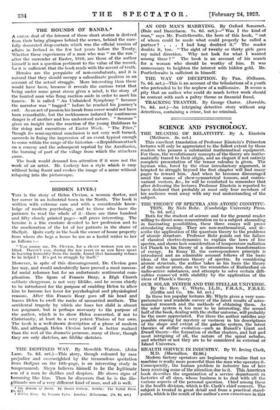HIDDEN LIVES.1
Tins is the story of Helen Clevion, a woman doctor, and her career in an industrial town in the North. The book is written with extreme care and with a considerable know- ledge of modern psychology, and to those who have the patience to read the whole of it—there are three hundred and fifty closely printed pages—will prove interesting. The heroine is a fine creature devoted to her profession and to the amelioration of the lot of her patients in the slums of Shellpit. Quite early in the book the owner of house property from whom she begs a house to use as a hostel writes to her as follows :-
" You amuse me, Dr. Clevion, for a clever woman you are so blind. Haven't you, during the ten years or so you have spent In learning humanity from the inside, found that humanity refuses to be helped ? It's got to struggle by itself."
However, in spite of this discouragement, Dr. Clevion goes her way, and would undoubtedly have proved a most success- ful social reformer but for an unfortunate sentimental com- plication. The figure of Francis Reay, .a High Church celibate clergyman, is not very lifelike, and he seems chiefly to be introduced for the purpose of enabling Helen to allow him to become her lover for psychological and physiological reasons. After this Francis Reay goes off his head and leaves Helen to swell the ranks of unmarried mothers. The accidental tragedy by which she loses her child is almost too poignant, but is perhaps necessary to the purpose of the author, which is to show Helen converted, if not to Christianity, at least to a very potent Theism of her own. The book is a well-drawn description of a phase of modern life, and although Helen Clevion herself is better realized than the rest of the dramatis personae, many of these, though they are only sketches, are lifelike sketches.










































 Previous page
Previous page